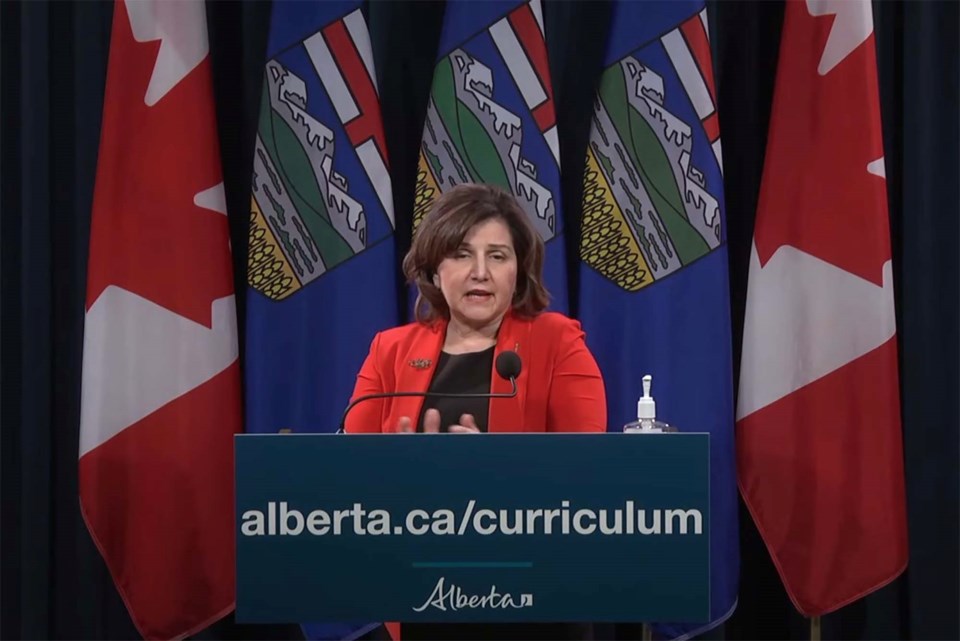Alberta’s education minister has hit the brakes on her rollout of most of the revamped K-6 curriculum, but has given phys-ed the green light to launch next fall — a launch one St. Albert phys-ed educator said will end in disaster.
Alberta Education Minister Adriana LaGrange announced changes to the rollout of the draft K-6 curriculum Dec. 13.
The province published a draft new K-6 curriculum in March. The 673-page document, once implemented, will set out what Grades K-6 students in Alberta will learn in school.
The draft was roundly criticized by parents and teachers for being overloaded with content, racist, and exclusionary, among other issues.
All four St. Albert and Sturgeon County school boards declined to pilot the curriculum this fall due to the pandemic and the draft’s problems, as did most Alberta school boards.
LaGrange pumps brakes
The curriculum was supposed to launch province-wide in Fall 2022, but LaGrange said the province had heard from teachers that this was not possible due to workload and resource constraints.
“There has been significant strain on the [education] system as a whole” due to the pandemic, LaGrange said.
“We really want implementation to be successful, and what we’re hearing is that in order for it to be successful, we have to slow the pace down.”
Instead, LaGrange said the province would launch just three of its eight revamped courses next fall: math, English, and physical education and wellness. LaGrange said these subjects emphasize reading, writing, and numeracy, which have affected by learning disruptions during the COVID-19 pandemic.
The fine arts, French language arts, French immersion language arts, and science curricula would receive minor adjustments (science would include more material on dinosaurs and climate change, for example), with new drafts to come this spring.
LaGrange said these changes would delay the rollout of the new Grade 7-10 curriculum, which is set to be piloted next year.
Alberta Teachers’ Association president Jason Schilling said this delay is a good first step, but the province still has much more to fix in the draft curriculum. The draft English curriculum features nothing on digital literacy, for example, and proposes to have elementary students study Shakespeare — a writer even high school students struggle with.
“They’re not going to get it,” Schilling said of the students, and this will turn them off from school.
Glenn Wilson, a phys-ed teacher at Leo Nickerson who is helping St. Albert Public evaluate the draft curriculum, questioned why the province had cut financial literacy out of the draft social studies curriculum and stuck it into phys-ed.
“We’re already struggling to teach the full spectrum of physical literacy as is,” he said, with most elementary students getting just 90 minutes of physical education a week.
“What are you going to sacrifice to put fiscal literacy in there in Grades 1 to 6? Do I teach [students] about the cost of a volleyball?”
Wilson said this draft is such a radical overhaul to phys-ed that teachers will need at least nine months of training ready to teach this new curriculum by next fall. Since none of the resources for that training appear to be ready right now, he predicted the proposed fall rollout would be a disaster.
Alberta Education is set to create an advisory group early next year to plan the rollout of the new curriculum.
Still overstuffed
LaGrange said the draft social studies curriculum will be reworked based on a new blueprint which reorganizes much of its content. Students will now learn more about local leadership, civic responsibility, and Indigenous and Francophone history throughout Grades K-6. Religions, the Silk Road, and ancient civilizations (which include ancient India and Persia) will now be taught in Grade 5 instead of Grade 2.
The blueprint still does not mention Canada’s residential school system prior to Grade 4. The Truth and Reconciliation Commission’s Calls to Action say provincial governments should teach students about residential schools starting in kindergarten.
Alberta Education officials said a new draft social studies curriculum will be released next spring.
Carla Peck, a professor of social studies education who teaches about curriculum at the University of Alberta, described the current social studies draft as “the worst draft of social studies I have ever seen in my entire career.” Peck said the draft does not reflect any research on how students learn and emphasizes facts and memorization over analysis and understanding.
Peck said the province’s decision to rewrite the social studies draft is the first sign she has seen that LaGrange is actually listening to criticism of the draft. While the blueprint has reorganized the draft’s contents and can help teachers focus their efforts, Peck said she is concerned it does not actually cut any material from the draft.
“Everyone who’s given feedback on social studies has said it’s absolutely overloaded with content,” Peck said, and this blueprint adds even more material to it.
The province has planned a virtual information session on the new curriculum Dec. 16 at 7 p.m. Visit www.alberta.ca/curriculum-have-your-say.aspx for details.




